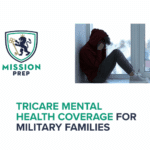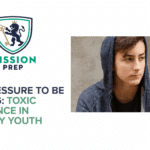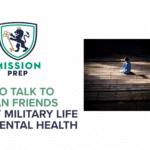Navigating TRICARE Mental Health Benefits for Adolescents

Healthcare is EXPENSIVE. There are no two ways about it. And if you or a family member have (or are) serving our country, the last thing you should have to worry about is healthcare costs.
TRICARE can help you manage financial barriers when you require healthcare services and are serving (have served or have a family member serving) in the military. Having TRICARE can provide peace of mind that you and your family can access the health service you need worldwide, without the worry of excessive costs or substandard care.
TRICARE services also allow you to connect to vetted, qualified medical professionals, wherever you are in the world – including English-speaking care providers abroad.
On this page, we cover everything you need to know about TRICARE mental health benefits for adolescents, including:
- What TRICARE is and why it’s important
- TRICARE mental health benefits for adolescents
- Treating specific mental health issues in teens with TRICARE
- Accessing mental health support with TRICARE
- TRICARE therapy costs and expenses
- Seeking TRICARE therapy with Mission Prep

What Is TRICARE?
TRICARE is a military healthcare program that covers those in active service (as well as retirees) and their families. It includes a network of medical services and healthcare and mental health professionals, who offer uniformed service personnel quality healthcare both at home in the US and abroad.
TRICARE has different plans available. Your TRICARE plan will cover several different types of care that you or your family may need, including emergency care, urgent care, primary care, preventive care, mental health, and special programs.
TRICARE plans vary in cost and the type of coverage and benefits provided. What’s more, the amount you pay for services will depend on your military status, your beneficiary group, and the type of care you require. Whether you need to pay upfront costs and what percentage is reimbursed may also vary depending on who you select as your care provider.
Depending on your specific TRICARE plan, you may be able to access care from:
- A military hospital or clinic
- A civilian network of TRICARE-authorized providers
- A non-network TRICARE-authorized provider
It’s important to note that TRICARE can only help you if you use an authorized medical service.
Why TRICARE Is Vital For Military Teens
The teen years are a critical time for both mental and physical development. This is also the age when mental health issues may begin to manifest.1 Adolescents may face mental health challenges during this time due to hormonal changes, social pressures, or environmental factors, to name a few.
What’s more, the lifestyle of military teens can lack stability due to regularly moving home or school, or from having a parent who is deployed away from the family. Children of military service personnel can also be at increased risk of experiencing family stress, grief, or feelings of isolation. As such, military teens may be especially susceptible to mental health challenges.2
Early diagnosis and access to the right support improve mental health outcomes.3 So, it is vital that military teens are able to access the mental health support and resources that they need and TRICARE can assist with this. Most adolescents who have a parent in active service will be eligible for TRICARE until they are 21 (or 23 if they are in college). A teen may also be entitled if their family member is now retired from duty.
TRICARE Mental Health Benefits for Adolescents
TRICARE acknowledges that the mental health and well-being of the children of military personnel are vital. The psychological struggles of children often take a toll on the parents and vice versa (such as is the case with post-traumatic stress disorder by proxy).4
As such, the healthcare of the whole family is covered under most TRICARE plans. Biological children, step-children, and adopted children of qualifying adults are all able to access the TRICARE mental health benefits.
Qualifying for TRICARE Therapy Coverage
TRICARE offers comprehensive coverage for mental health services that are deemed ‘medically necessary.’ If your teen is experiencing mental health challenges that are affecting their well-being or the dynamics of your military family, it’s important to seek treatment for them as soon as possible.
If you are a military parent, to get TRICARE for your child you must:
- Register with the Defense Enrollment Eligibility Reporting System (DEERS)
- Select a TRICARE health plan and enroll your child if necessary
For TRICARE to cover your therapy, you must ensure that you are using only a TRICARE-authorized provider. This can be a network or non-network provider, but your provider must meet the requirements of being:
- Licensed by the state, accredited by a national organization, or meet certain standards set by the medical community
- Certified to provide benefits under TRICARE
Some military hospitals and clinics also offer mental health care for children and youth. For outpatient services, you can make an appointment with a TRICARE-authorized mental health network provider, regardless of which health plan you have. However, it’s worth noting that healthcare services covered under TRICARE must be considered necessary, medically safe, properly registered, and non-experimental.
Referrals and Pre-Authorizations
You may need a ‘referral’ if your primary care provider thinks that you require treatment for something that they do not offer. A pre-authorization means that your regional contractor has approved your care prior to you attending your appointment.
If your teen needs to be referred for mental health treatment, they should get a referral and pre-authorization done at the same time.
Treating Specific Teen Mental Health Concerns With TRICARE
According to the Centers for Disease Control and Prevention (CDC), some of the mental health problems that children and young people may experience include:
- Anxiety and depression
- Behavioral problems
- Obsessive-compulsive disorder (OCD)
- PTSD
Poor mental health can cause teens to withdraw socially, perform worse at school, or engage in risky or destructive behavior.5 In extreme cases, mental ill-health in teens may lead to self-harm or even suicide.6 So, it’s important that teen mental health isn’t taken lightly.
TRICARE’s mental health benefits for adolescents mean that they will cover most mental health services that are deemed medically necessary. However, it is important to connect your teen with the right type of mental health care.
Sometimes, a combination of medication (such as antidepressants) and therapy is needed; combining cognitive behavioral therapy with selective serotonin reuptake inhibitor (SSRI) antidepressants has been shown to boost recovery rates in depressed teens, for example.7
If you feel that you are better suited to online therapy, your regional contractor will have a list of approved providers that offer telemedicine services, such as Mission Prep. Telehealth allows you to access professional mental health support in the comfort of your own home.
Accessing Mental Health Support With TRICARE
TRICARE covers a variety of services to support the mental health of military teens. Covered services include:
- Psychotherapy (Counseling and Talking Therapies): This includes inpatient and outpatient services and covers individual and family/ group sessions.
- Psychological Testing and Evaluation: TRICARE covers psychological testing and assessment for diagnostic purposes and to inform a treatment plan. It is NOT covered for academic purposes.
- Psychotropic Drugs: These are covered when prescribed by an authorized provider as part of your treatment plan.
- Electroconvulsive Treatment (ECT): This form of medical treatment for severe mental health difficulties may also be covered.
- Collateral Visits: These are visits between the care provider and a family member or caregiver.
Ancillary therapies (meaning supplementary or supportive therapies such as occupational therapy and art, music, or dance therapy) may have mental health benefits for adolescents. These may be covered if they are offered as part of a structured program in an approved facility such as an inpatient facility, residential treatment center, or intensive outpatient program.
Finding TRICARE Mental Health Providers
For help ofinding TRICARE mental health providers or scheduling an appointment, you can check out TRICARE’s dedicated page here.
Depending on your plan, options may include:
- Consulting with your primary care manager
- Using the ‘find a doctor’ tool
- Scheduling an appointment with a network psychiatrist or psychologist in your region (included if you are enrolled in TRICARE Prime)
If you are enrolled in the US Family Health Plan you can search your plan’s provider directory to schedule a mental health care appointment. You won’t need a referral for an outpatient appointment (except for psychoanalysis) but you will need one for a hospital stay.
TRICARE Therapy Costs for Teens
When you sign up to TRICARE it’s worth taking time to familiarize yourself with your plan, how much it costs, and the benefits it gives you. For example, if you are required to pay some of the costs yourself – these are called “out-of-pocket” costs.
Out-of-Pocket Costs
Always check that your plan covers any mental health treatment or therapy that your teen needs to avoid any unexpected costs or bills to pay. For example, if you visit a non-network provider you may have to pay higher costs and you may have to handle your own claims.
In some instances, you may have to pay upfront costs and make a claim for reimbursement. It is important to ensure that you can afford to do so and that you are not placing yourself in unmanageable debt as this can cause additional stress and strain on your family. If possible, make some preparations for the interim time whilst you wait to receive your money back.
Maximizing Benefits
To keep your out-of-pocket costs as low as possible, make sure you know the rules about referrals and authorizations before making an appointment. It’s good to also familiarize yourself with their exclusions to understand what types of services are NOT covered to avoid any unexpected charges.
Furthermore, we recommend seeking out advice as to whether you are entitled to any other help or government benefits to use in conjunction with TRICARE that may help you or your family. We can provide guidance like this and more at Mission Prep.

Getting Support for Military Teens at Mission Prep
If you are a military teen (or the parent or caregiver of a military teen) who is experiencing mental health challenges, we understand that this can be a worrying and stressful time. We also understand that navigating the American healthcare system can cause additional stress and worry to you. Our friendly and qualified advisors are available to talk you through the process and help you find the most suitable treatment option for you or your family.
At Mission Prep, we thank you for your service and we want to extend our support to you as an authorized TRICARE provider. In addition to the blog section on our website that contains a wealth of advice and resources for you and your family, we offer teen mental health services, such as cognitive behavioral therapy (CBT) and dialectical behavior therapy (DBT).
We can discuss both inpatient and outpatient options with you to find what suits you and your family the best. What’s more, our professional therapists are experienced in dealing with a range of issues that may affect the well-being of military teens, including:
- Anxiety
- Depression
- Trauma and PTSD
- Academic and social challenges
We can also offer treatment via our telehealth services which may be convenient if you move around frequently or would struggle to travel to appointments.
If you are a teen struggling with your mental health, or the caregiver of a young person who needs support, please get in touch today for a confidential conversation about how we can help.
References
- Solmi, M., Radua, J., Olivola, M. et al. Age at onset of mental disorders worldwide: large-scale meta-analysis of 192 epidemiological studies. Mol Psychiatry 27, 281–295 (2022). https://doi.org/10.1038/s41380-021-01161-7
- Kinley, J., Feizi, S. & Elgar, F.J. Adolescent mental health in military families: Evidence from the Canadian Health Behaviour in School-aged Children study. Can J Public Health 114, 651–658 (2023). https://doi.org/10.17269/s41997-023-00758-5
- Colizzi, M., Lasalvia, A., & Ruggeri, M. (2020). Prevention and early intervention in youth mental health: is it time for a multidisciplinary and trans-diagnostic model for care? International Journal of Mental Health Systems, 14(1). https://doi.org/10.1186/s13033-020-00356-9
- Tan S, Rey J. Depression in the Young, Parental Depression and Parenting Stress. Australasian Psychiatry. 2005;13(1):76-79. doi:10.1080/j.1440-1665.2004.02155.x
- Agnafors, S., Barmark, M., & Sydsjö, G. (2020). Mental health and academic performance: a study on selection and causation effects from childhood to early adulthood. Social Psychiatry and Psychiatric Epidemiology, 56(5), 857–866. https://doi.org/10.1007/s00127-020-01934-5
- Verlenden, J. V., Fodeman, A., Wilkins, N., Jones, S. E., Moore, S., Cornett, K., Sims, V., Saelee, R., & Brener, N. D. (2024). Mental health and suicide risk among high school students and protective factors — Youth Risk Behavior Survey, United States, 2023. MMWR Supplements, 73(4), 79–86. https://doi.org/10.15585/mmwr.su7304a9
- Van Voorhees, B. W., Smith, S., & Ewigman, B. (2008, November 1). Treat depressed teens with medication and psychotherapy. https://pmc.ncbi.nlm.nih.gov/articles/PMC3183842/



















